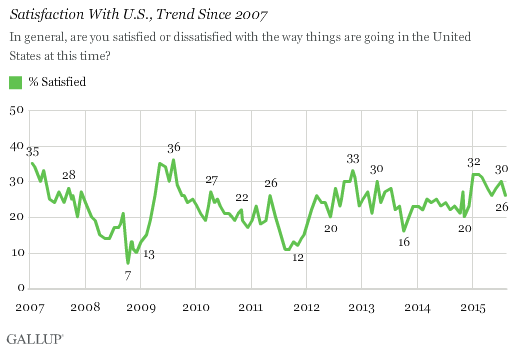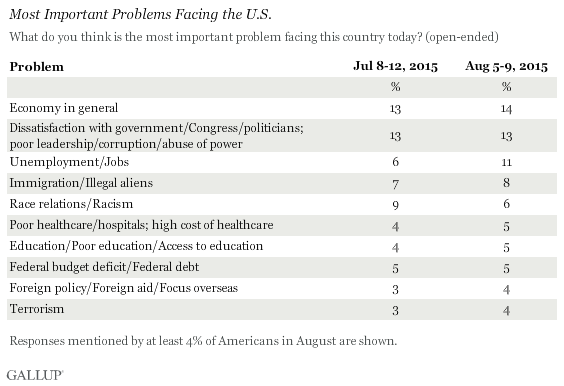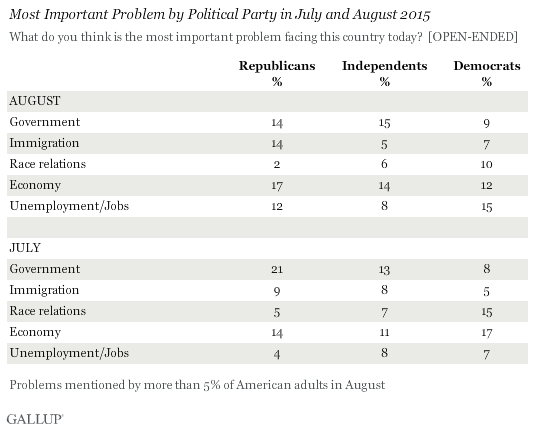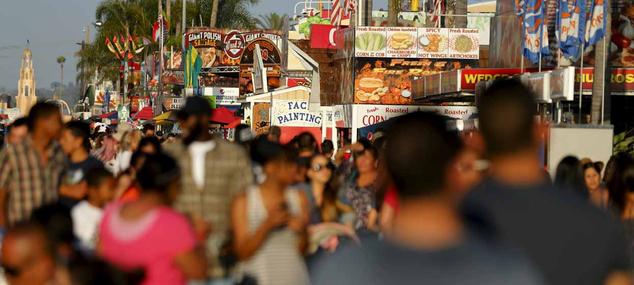Story Highlights
- Satisfaction slightly lower than earlier in 2015
- Economy, government, jobs cited as top problems
- Republicans more likely than Democrats to mention immigration
WASHINGTON, D.C. -- Twenty-six percent of Americans are satisfied with the way things are going in the U.S., down slightly from 30% in July. This is also on the lower end of what Gallup has found in its monthly measures of this question throughout 2015, though it is still higher than most 2014 readings.

Generally, less than 30% of Americans have expressed satisfaction with the country's direction since 2007. There were brief spikes in mid-2009 after President Barack Obama took office and again in late 2012 near the time he was re-elected. In fact, today's 26% satisfaction rating is slightly above the average 22% seen over the past eight years. This has been an extraordinarily long spell of subpar satisfaction when compared with Gallup's full trend since 1979. Prior to 2006, ratings lower than 30% were the exception, not the rule.
Economy, Government, Jobs Most Important Problems Facing the U.S.
Americans do not have a clear issue in mind when they are asked to name, without prompting, the most important problem facing the country. More than one in 10 mention the economy in general (14%), dissatisfaction with the government (13%) and unemployment or jobs (11%). These three issues have been largely at the top of Americans' minds for several months. Immigration and race relations are also mentioned by more than 5% of Americans this month.

The percentage of Americans mentioning each of the specific problems was largely stable between July and August. Mentions of unemployment/jobs increased, despite a relatively strong hiring report from the U.S. government. This increase brings mentions of unemployment back to where they have been for most of 2015, after a lower-than-usual percentage of Americans mentioned unemployment in July.
Slightly fewer Americans say race relations or racism are the top problem this month; however, the percentage who mention it has varied a great deal as racially charged events have entered and faded from the news cycle. This month's polling was completed on the one-year anniversary of Michael Brown's death, which has prompted new protests in Ferguson, Missouri. Those protests escalated the day after polling ended, with the county executive declaring a state of emergency.
Democrats and Republicans Differ on Most Important U.S. Problem
The Aug. 5-9 poll finds Republicans much more likely than Democrats to name the government or immigration as the most important problem. Democrats are more likely than Republicans to cite race relations. This may be related to black Americans being more likely than white Americans to mention race relations as the most important problem, and many black Americans are Democrats.

Among Republicans, mentions of the government as the most important problem dropped in August. Instead, Republicans were more likely to name unemployment/jobs and immigration in August than in July. This may be fueled by what the Republican 2016 presidential candidates are focusing on in their campaigns, with their first debate prompting many comments about immigration.
Bottom Line
Americans' satisfaction with the way things are going in the U.S. is down slightly from earlier this year. This matches a pattern seen in Gallup's Economic Confidence Index. Americans do not identify a single dominant issue as the most important problem facing the country, but the economy, government and jobs are the ones they are most likely to mention.
Democrats and Republicans differ in their views of the nation's most pressing problem. As the country begins to gear up for the 2016 presidential election, candidates need to find a way to address the many problems Americans identify. If the current mood continues, candidates may find a largely unsatisfied nation that does not identify a single overarching issue as the most important problem facing the country.
Historical data on these questions are available in Gallup Analytics.
Survey Methods
Results for this Gallup poll are based on telephone interviews conducted Aug. 5-9, 2015, with a random sample of 1,011 adults, aged 18 and older, living in all 50 U.S. states and the District of Columbia. For results based on the total sample of national adults, the margin of sampling error is ±4 percentage points at the 95% confidence level. All reported margins of sampling error include computed design effects for weighting.
Each sample of national adults includes a minimum quota of 50% cellphone respondents and 50% landline respondents, with additional minimum quotas by time zone within region. Landline and cellular telephone numbers are selected using random-digit-dial methods.
View survey methodology, complete question responses, and trends.
Learn more about how Gallup Poll Social Series works.

